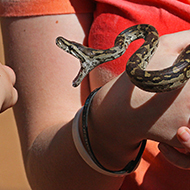Study finds increase in exotic snakebites in the UK

Exotic snakebites are rare in the UK, but cause a substantial challenge for healthcare providers.
A study has found that snakebites are becoming a more common injury in the UK, owing to a rise in exotic pet ownership.
Reviewing data from the UK National Poisons Information Service (NPIS), researchers identified key statistics and finding surrounding incidences of snakebites in the UK, shedding light on the resulting challenges for healthcare professionals, and need for expert advice in these cases.
From 2009 to 2020, 321 snakebite enquiries in 300 patients were recorded by NPIS, with 10 patients bitten on more than one occasion.
Following reports on snakebites between 1970-79 and 2004-10, researchers found that the number of snakebites, including venomous snakebites has increased with the number of exotic pet owners.
Retrospectively analysing the data, researchers found that the majority of snakebites occurred in males (64.5 per cent) and adults (77.6 per cent). However, in this period, 72 exposures occurred in children aged 17 and under, with 13 of these under 5 years old.
Highlighting the correlation between snakebites and exotic pet ownership, the study found that 81 per cent of bites involved pet snakes in the home. Occupational exposure for zoologists, pet shop employees and reptile specialists accounted for 11.8 per cent of cases.
A total of 68 snake species were the subject of enquiry over the selected time period, with the Colubridae family of snakes accounting for just over half of the cases.
Of the enquiries reviewed, researchers were able to obtain outcome data for 44, patients made a complete recovery in 38 cases, four patients had ongoing features at time of discharge, but were predicted to make a full recovery, one patient had permanent sequelae, and one case was fatal.
The study's results display an increase in the number of exotic snakebites reported to NPIS, though the species diversity remained broad, and males were still more likely to experience snakebites, as previous studies identified.
In the conclusion of the paper, researchers wrote: “Despite their low incidence, envenoming from exotic (non-native) snake species presents a substantial challenge for UK healthcare professionals.
“Although the most severe envenomings result from bites by Viperidae or Elapidae, these are rare and typically occur in those people (usually male) who keep snakes as part of their occupation or hobby and are therefore at risk of multiple bites.
“These exposures can result in venom hypersensitisation and the risk of venom-induced anaphylaxis.”
Published in Clinical Toxicology, the full paper is open-access and available to read now.



 The latest
The latest